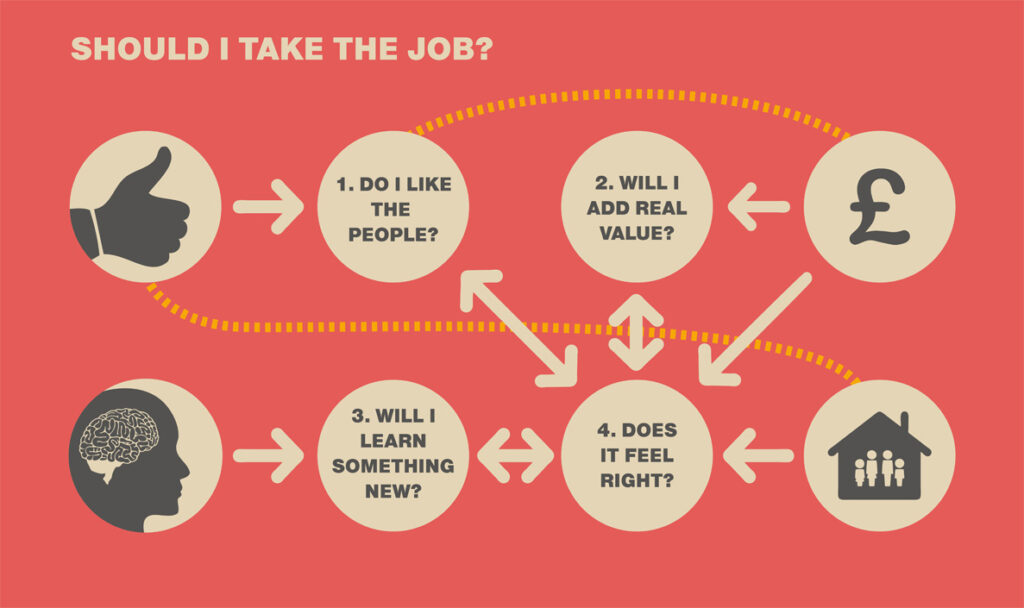At Savannah Group we work hard, take pride in what we do and are diligent and honest in our assessment of candidates. We know better than most that finding real talent is hard. Finding real talent with increasingly narrow parameters in a highly competitive market is even harder. Finding the rare individual who is willing to move from the company in which they are in and (no doubt) well looked after is even more difficult.
So when we get to the end of a search and the preferred candidates asks: “Should I take the job?” It is very easy to say YES – PLEASE DO!
But the answer isn’t always that simple….
As headhunters, we are asked for career advice on a daily basis. Whether or not a role is “right” for an individual is hard for us to answer with any certainty. It is a very personal decision with a plethora of different factors to take into account.
After a decade of advising both clients and candidates, I have come up with four simple questions that I feel provide a sound basis for either accepting or rejecting a new role:
- Do I like the people?
- Will I add real value?
- Will I learn something new?
- Does it feel right?

In my opinion, answering these four questions honestly holds the key to understanding whether you should take a new job or not.
1. Do I like the people?
If we are doing our job as a headhunter properly, all candidates met by the client will be able to do the job from an experience point of view. The client’s focus should therefore be on assessing cultural fit and hygiene factors around motivation and further career progression.
Clients often comment on the pub test – would I want to have a beer with this person? This is potentially a dangerous test – it’s not about liking the individual and hiring someone in one’s own image – it should be more about:
- Potential succession plan
- Effect on the rest of the team
- Does it make sense for their career?
- Cultural fit with the wider organisation
The same is true for the candidate. They will have seen a job brief and will know whether or not they have the necessary experience.
A candidate should therefore be assessing whether or not they can work with the people they meet and whether they have a good “feel” for the company. Do you like the offices, location, coffee machine… does it feel right?
2. Will I add real value?
When going into a new role, it is essential to make a positive impact right from the off. Take your time to meet people and to understand the business and key stakeholders that will affect your ability to be successful and remember, you have been hired to add value.
A company is paying a significant amount of money and taking a certain level of risk in recruiting you into their organisation. You need to be clear where and how you are going to add value to their business before accepting the role. This can be in any number of areas but you have to feel confident that you will prove your worth in the short to medium term. If you doubt this ability or place the likelihood of success as low, think carefully about taking the job.
3. Will I learn something new?
When thinking about taking a new role, particularly when you are still building your experience and skillset, it is important to identify areas of stretch or new learning.
Examples could be:
- A new geography, culture or language
- A new ownership structure
- A new sector
- A new function
You should be aiming to keep learning with every new role. The more you learn, the greater your value will be going forward.
It’s important to find the balance between a role that will stretch you and a role that may stretch you too far and put you in danger of failing.
From the employer’s point of view, why would they hire a CFO who has only ever worked in Bristol for a UK Plc in FMCG to take a CEO role in a highly international technology business based in Manila that is private equity owned? An extreme example but the stretch needs to be there for the candidate but not to the point where it will put off the client.
4. What’s my gut feel?
If you are looking at a new role, either internally or externally and can answer the other three questions positively, it likely that the answer to this question will also be a yes.
If you either don’t like the people or don’t feel that you can add any value in the new role, then your gut will tell you that it is not the right move and you should reject the role.
What about money?
The eagle-eyed amongst you will notice that there is no mention of money. My assertion is that if you can answer all four of these questions in the positive then take the job – the money will look after itself.
For example:
- Do I like the people? – if the chemistry from both sides is positive the employer will want you in the business – if not, money is a moot point
- Will I learn something new? – if you are not developing yourself as an individual then you may not find the role as rewarding and progress later in your career may slow
- Will I add real value? – if you are not going to add value in any number of ways then why do you deserve to be paid well?
- Does it feel right? – if the money is not at the level expected, then your gut will tell you that it is the wrong move.
If you can answer “yes” to these four questions, then the remuneration will in all likelihood be acceptable.
When it comes to other hygiene factors such as family, location, schooling – rely on your gut to tell you whether it is the right move for all those affected by the change.
What’s Next?
When looking at making an all-important career move (and they are all important), ask yourself these four simple questions. If you can answer yes to all four, then take the job. If any of the answers are “no” or “I am not sure”, it is the wrong role and may end up being a bad move.
Although simplistic, it could help you dodge a bad career move and, from our client’s perspective, avoid you recruiting the wrong person.




